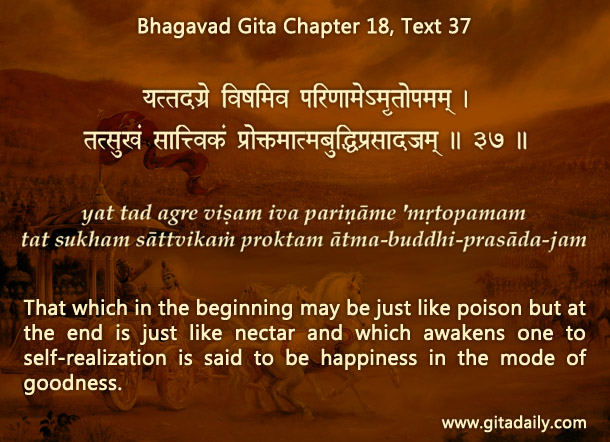We often equate hurt, the sensation of pain, with harm: injury or damage. And they do frequently correlate. If our hand goes too close to fire, the burning sensation warns us about impending injury. Indeed, presuming that hurt equates harm triggers our reflex actions, which protect us from much danger.
However, equating hurt with harm can mislead us because the two don’t always go together. Consider two exceptions:
Not everything that harms, hurts: Many indulgences that are actually harmful feel good initially — for example, consuming sugar-rich substances. Pertinently, the Bhagavad-gita cautions that some indulgences which turn out to be like poison eventually appear to be like nectar initially (18.38).
Not everything that hurts, harms: During a workout that pushes us to our limits, our muscles hurt. However, that strain doesn’t necessarily mean that we are being harmed; it often indicates that our muscles are growing, making us fitter. Similarly, when a pregnant woman has labor pains, the hurt is not usually harmful; it generally paves the way for a lovely new life. Pertinently, the Gita states that some things that taste like poison initially taste eventually like nectar (18.37).
Remembering that our impression of things doesn’t necessarily equate with the impact of those things on us, we can become more discerning in our choices. Understanding that things sometimes have a counter-intuitive nature is essential if we want to grow spiritually. Therein, we often need to pursue disciplines that don’t feel good, but do us a lot of good. For example, the bhakti-yoga principle of focusing our mind on the ultimate reality, Krishna, evokes vehement opposition from our mind. Facing that opposition hurts, but doesn’t harm. Rather, it purifies and prepares us to become lovingly absorbed in Krishna, thereby relishing the highest happiness.
One-sentence summary:
Not everything that hurts is harmful; not everything that is harmful hurts.
Think it over:
- Why do we equate hurt with harm?
- Which things do you presume are harmless because they don’t hurt?
- Which things do you presume are harmful because they hurt?
***
18.37: That which in the beginning may be just like poison but at the end is just like nectar and which awakens one to self-realization is said to be happiness in the mode of goodness.
To know more about this verse, please click on the image
Explanation of article:
Podcast:


Leave A Comment